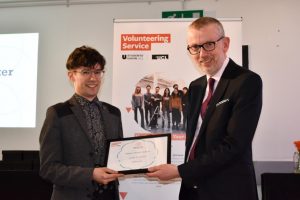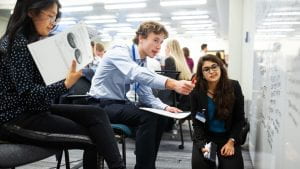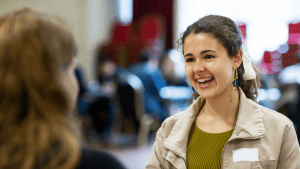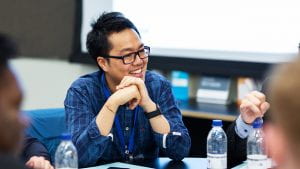Read time: 5 minutes
Written by George Barker, Medicine MBBS BSc, 2021

We sat down with award-winning UCL student (soon to be Medicine MBBS BSc graduate!) George Barker to discuss how his experiences with UCL Careers Extra has empowered his achievements while studying at UCL, including winning TargetJobs 2021 LGBT+ Undergraduate of the Year Award.
1.) Where are you from?
I grew up on the Wirral, in the North West of England.
2.) Why did you choose UCL?
I had visited London before coming to UCL on a short holiday and absolutely loved it. It’s the centre where so much happens in the UK, which is both an excellent thing and can also be a bit daunting when you come from somewhere so far away up North. And I had to make a decision, is that something I want to move closer to? I wanted to move to a new city and I wanted to move to a bigger city. I wanted that city to be global and multicultural, have opportunity and have a community that I would feel welcomed by. So I set about thinking about where I wanted to go to university. I didn’t quite feel that Oxbridge was for me (even though the school perhaps tried to push us in that direction). UCL is a research intensive Russell Group university in the heart of London, it teaches subjects from a wide variety of faculties so you can meet people from all sorts of backgrounds. I applied to some other London universities but UCL was very much my top choice. Also, the course structure was one that worked better for me, and there was the integrated BSc that all students get to do (which isn’t the case in all universities). The hospitals that UCL is affiliated with are some of the best in the UK, with specialists from Europe and the world, and is also research intensive. I was interested in being involved in academia and not just learning to become a doctor but how to be a clinician scientist as well. There’s also a wide variety of extra-curricular activities, plus the fact UCL offers full body dissection, which I still think is the best way to learn anatomy.
3.) Have you always wanted to pursue medicine as a career?
I think there was a time in school when I was strongly considering a career in astrophysics. I’d always been interested in space and physics and thoroughly enjoyed it through secondary school. And then I started to gain more of an understanding of health care and veterinary care and working as a doctor or a dentist, and eventually, after doing some work experience within a clinical skills centre at my local hospital, decided to pursue medicine.
However, I was able to combine the space interest a little bit. In my third year I did an integrated BSc in Medical Sciences with Physiology. I did a module in extreme environments, which included space medicine and how medicine is important clinically for astronauts and cosmonauts. It’s that Applied Physiology, where you take the body and put it in an abnormal environment that I find quite interesting. So that interest in physics and space is still very much there.
4.) What extra experiences have you undertaken during your studies?
In addition to your integrated year you get to pick in your final few weeks an area of medicine you’d like to spend more time on, to gain a deeper understanding and expose yourself to a specialty that you haven’t done before. So I decided to do half of mine in anaesthetics and then spend two weeks down in Plymouth in this regional Hyperbaric Centre for the South West and South Wales. We treat diving emergencies and give them emergency recompression.
I’ve also been involved in other things outside my studies – charity and volunteering. I volunteered with Sexpression UK for 7 years in total during my studies. It’s a peer-led, student-led, UK wide charity that provides relationship and sex education sessions to secondary school children. We go out and teach informative, non-biased, inclusive, comprehensive relationship and sex education. When I was at school sex education was usually taught by a teacher who was not overly enthusiastic, and with the content not really being applicable to me or including me in the way I would have wanted, I came away with more questions than answers. And when your questions aren’t answered at a time when you are young, trying to work out who you are, it’s really difficult. You don’t know where to turn to get accurate, correct information that’s also supporting you, not saying horrible and nasty things. So, I wanted to make sure that wouldn’t happen to other people – hence my involvement in Sexpression UK. I was heavily involved at UCL, running the branch, then I became the Externals Director and later the National Director of the charity itself. I became a Trustee of the charity as well – my term finished in September 2020.
That was an incredibly interesting experience that I never thought that I would get at university, and there’s lots of things about coming to UCL that I would never have thought I’d end up doing. But I’m ever so glad I did.
5.) How has the Careers Extra team helped you?
Sexpression UK and charity work has always been important to me but it’s a small charity, with no paid members of staff, just students volunteering their time. Trying to balance that with medicine and balance it against needing some sort of funding in order to live in London can be a real challenge, especially when during the summer I was volunteering and didn’t have the time to do paid work. UCL has a variety of different ways to support people. The UCL Careers Extra Bursary provided me with financial assistance over the summer. Additionally, I’ve used the UCL Careers appointments for medical students to talk about different opportunities in medicine and some of the more non-traditional routes through medical training. I found that to be a real benefit in trying to navigate through quite a complex training structure.
6.) Are you a member of any student societies at UCL?
Yes, for 7 years, I’ve been part of the MDs comedy revue, the medical school’s comedy sketch troupe. We do sketch and song and dance about medicine, hospitals, UCL and everything else. I guess some of the highlights would be we went to Edinburgh and sold out a show there and got nominated for an award. We’ve done some collaborative shows and we actually officially reopened the Bloomsbury theatre twice. I think it’s really important to have a creative outlet, a way to express yourself artistically, and I found it a wonderful way to relax with like-minded, creative people. It’s good fun and I think if we’re having fun, then the audience probably has a bit of fun as well.
7.) How did the LGBT+ award come about?
I had heard about the award before but had never applied. I started applying this year, just to get more information about it. I was hesitating about it – the prize was a law internship, so I assumed it would go to a law undergraduate or someone else from a non-STEM background. So I thought maybe there was no point in applying. Then I got a phone call from the people at Targetjobs and they reassured me it was designed to be for everyone. I had to do an online personality test, then an online logic assessment, then there was a virtual crystal maze social event, after which there was an assessment centre with two stations – the first one a competency based interview and the second one a case study. I didn’t hear anything for a while, then found out I was in the final, which was a nice surprise at a time when there weren’t many nice things going on in the world and most of my days were filled with revision for my finals. And the day after my final written paper there was an online awards ceremony, hosted by Rachel Riley from Countdown. I tuned in and found I’d won, much to my surprise!
So that’s how it came about and how I have acquired a law internship. It’s not something I’ve explored before, but one of the things I’ve enjoyed, both within and outside of UCL, is doing different things I wouldn’t have otherwise done. It’s run by Clifford Chance, and a donation was also made to Sexpression UK by Clifford Chance, which was really good news when so many voluntary organisations and community groups are really struggling in terms of raising donations.
8.) What single achievement are you most proud of from your time at UCL?
There’s two – academic and non-academic. Academic wise it was securing an Academic Foundation Programme offer, which is a relatively competitive combined clinical and academic job for two years and that’s kind of my first job as a doctor in a location I’m really happy with and rotations I’m looking forward to. I think that as a working class, first generation student, I’m not the kind of person that is normally proud of their achievements (it’s maybe not a very northern thing), but I am really, really made up that I’ve been able to do that and to show that even though the odds were really not in my favour, if you put the graft in and work at it you can do it. Having done that means a lot to me.
In terms of non-academic, I think it’s confidence. If you had told me when I left school that by the time I finish university I’d have had the confidence to get up on a West End stage, perform to a West End audience, singing, in a dress, doing solos, I would have absolutely laughed (or run away). I ended up taking some singing lessons supported by a bursary from the medical school – it’s called the Heller bursary to do something artistic and learn something artistic. So I’ve been having singing lessons and I just got up on stage and sang my heart out. I think the story there is to have the confidence to do something outside your comfort zone, learn a completely new skill. That confidence is something that I did not have coming into university and apparently now I do. And doing that and making people laugh, I think is very important, especially in times like these.
9.) We’ve talked about what you’re planning to do when you graduate, but you’ve also mentioned it’s quite a complex career path. Tell me a little bit more about your plans.
There are a number of training paths in medicine that you can go in at one end and pop out the other end. For me, it’s not something I want to rush my way through to complete as fast as possible, I’d rather do interesting opportunities. I will probably take at least one year out, perhaps a couple to pursue interesting opportunities inside and outside of medicine. I also want to travel, which I’ve not had the opportunity to do. There are interesting opportunities in terms of extreme medicine, I’d also like to practise somewhere that isn’t London. In terms of specialty training, I think the two that stand out would be anaesthetics and sexual health and HIV but that’s by no means set in stone and I’m happy for that to change. You start to understand the topics you like and the topics you don’t. It’s also important to know more about the jobs I will like, and find out which fits best for me and my life.
10.) What one piece of advice would you give to a new student just starting at UCL?
UCL is full of so many different opportunities, be that through your course, outside or your course, through UCL itself, through the student’s union – make the most of them and go out and try and find out more about them. There are so many it can be difficult to find what’s available. When you have done that, try something, give it a go. Being a student is the time to find out what you like, what you don’t like, what you enjoy doing. And UCL is able to offer so much of that. It doesn’t have to go brilliantly, but it is a time of your life to try new experiences – you may end up surprising yourself. Push yourself out of your comfort zone and try something new.

 Close
Close









